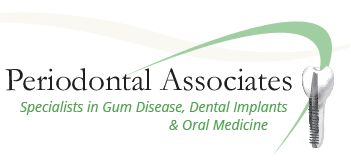It’s no secret to denture wearers—dentures are a lot of trouble. Dentures lack chewing power (as little as 10% compared to natural teeth), they lose their fit and require messy adhesives, and it’s embarrassing when a denture slips or falls out. They must be removed for cleaning. The acrylic used to make dentures can look and feel bulky and unnatural, and, even worse, wearing dentures leads to continuous bone loss and a prematurely aged appearance.
What Causes Bone Loss?
Bone health depends in part on the stimulation of full-force chewing provided by natural teeth. When teeth are missing, the bone in the jaw begins a continuous process of reabsorption. Dentures actually hasten bone loss by creating constant friction on the bony ridge that used to be protected and supported by the teeth and their roots. As more bone is lost, dentures become loose. They move around during eating and speaking and need to be relined by a dentist. Eventually, so much bone is lost that the lower part of the face collapses in on itself. The chin moves toward the nose and the mouth and cheeks sink in, causing deep wrinkles and folds.

Even Dentures That Fit Well Have Drawbacks
Denture wearers find that speaking and eating is more difficult with their artificial teeth. Lower dentures are especially prone to slipping because the normal movement of the tongue can push them out of place. The upper denture has an uncomfortable false palate covering the roof of the mouth that interferes with the ability to taste and enjoy foods.
Limited Food Choices
There are a number of foods that denture wearers try to avoid. Strawberries, blueberries and other fruits have tiny seeds that can get trapped between the denture and the gums, causing discomfort. Other foods—such as apples, corn on the cob, nuts, steak and more—are simply too difficult to eat because of the lack of biting and chewing power. This limited access to a variety of healthy foods can negatively impact overall health.

Dental Implants Are the Answer
Implant-supported full-arch teeth don’t have these drawbacks. The aesthetic and natural-looking replacement teeth provide greater chewing power, allowing patients to eat all the foods they enjoy and that keep them healthy. Because the teeth are firmly attached to dental implants, no slippage occurs, and the false upper palate of dentures can be eliminated. Additionally, chewing with implant-supported teeth helps to retain bone health rather than encourage bone loss. This helps patients maintain a youthful and healthy look. With proper care and maintenance, dental implants may last 40 years or more.
Fixed-In or Removable Implant-Supported Teeth
Permanently fixed-in implant-supported teeth are the most durable option for replacing a full arch of teeth. The replacement teeth look, feel and act like natural teeth and provide as much as 90 percent of natural chewing power. With the revolutionary New Teeth in One Day procedure, patients have their implants placed and receive fixed-in provisional teeth in a single appointment.

Another option is removable dentures that snap on to dental implants. Patients who choose snap-in dentures report that their chewing power is as much as six times higher than before, with no need for adhesives! Snap-in dentures are an affordable solution—sometimes the patient’s existing denture can even be adapted to attach to the implants.
Highly Trained and Experienced
The doctors at Dallas Periodontal Associates are dental implant experts. Drs. Tanur and Ovadia have completed extensive training in implant dentistry as part of their periodontal specialist education and they stay abreast of advances in techniques and technology through continuing education. Their knowledge, skill and experience mean that patients undergoing implant treatment can expect minimally invasive procedures, a very high success rate and an aesthetic, long-lasting outcome. The results are happy patients who can smile, talk and chew with confidence and enjoy an improved quality of life!
To make an appointment, call 214-377-0855 or request an appointment online.

